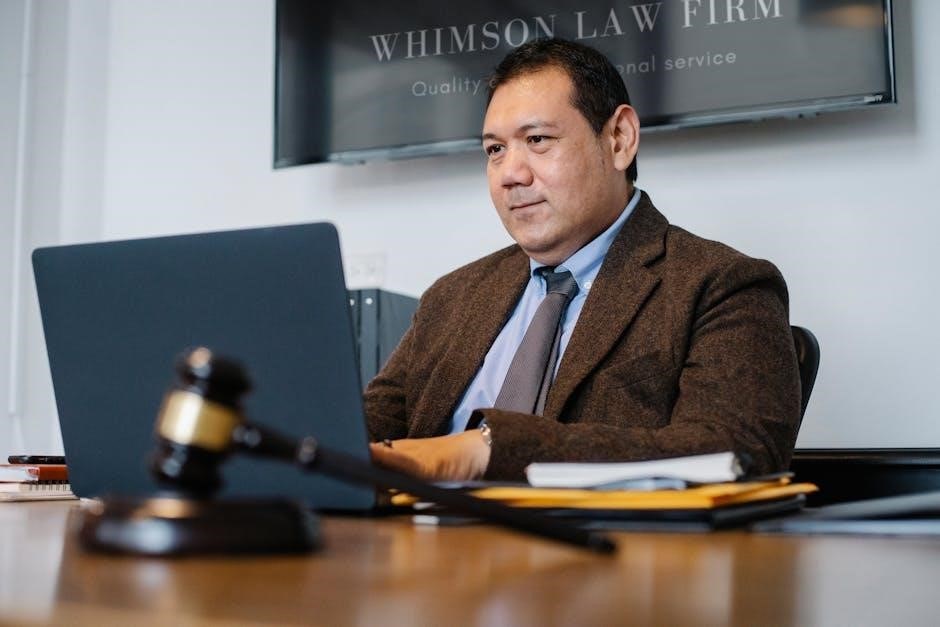The Massachusetts Open Meeting Law ensures transparency in government by requiring public bodies to conduct meetings openly. Established in 1977, it mandates access to deliberations and decision-making processes, fostering accountability and trust in governance. This law applies to all public bodies, including subcommittees, ensuring the public’s right to observe and participate in governmental affairs. Understanding this law is essential for maintaining democratic integrity and ensuring public confidence in governmental actions.
Overview of the Law
The Massachusetts Open Meeting Law promotes transparency by requiring public bodies to conduct meetings in an open and accessible manner. Enacted in 1977, the law ensures that government decision-making processes are visible to the public. It applies to all public bodies, including committees and subcommittees, ensuring accountability and fostering trust in governance. Key provisions include posting meeting notices, maintaining detailed minutes, and allowing public participation. The law also regulates executive sessions, limiting them to specific purposes. Compliance is enforced by the Attorney General, with penalties for violations. This framework ensures that citizens can observe and engage with governmental affairs, upholding democratic principles and transparency in public decision-making.
Importance of Transparency in Government Meetings
Transparency in government meetings is fundamental to a functioning democracy. It ensures that public officials act in the best interest of citizens, fostering accountability and trust. By requiring open meetings, the Massachusetts Open Meeting Law prevents secret decision-making, allowing the public to understand the reasoning behind policies. This openness discourages corruption and ensures that decisions reflect community needs. Transparency also promotes civic engagement, enabling citizens to participate meaningfully in governance. Without it, public confidence in government erodes, and the legitimacy of decisions may be questioned. Thus, transparency is essential for maintaining trust and ensuring that government actions remain fair and just.

Key Provisions of the Massachusetts Open Meeting Law
The law mandates transparent government operations through specific requirements, including meeting notices, quorum definitions, detailed minutes, and strict executive session guidelines to ensure accountability and public trust.
Meeting Notice Requirements
Public bodies must post meeting notices in a publicly accessible location and on their website, if available, at least 48 hours before the meeting. The notice must include the date, time, place, and agenda of the meeting. Emergency meetings, requiring immediate action, can be called with shorter notice but must still be publicly disclosed. The agenda must detail all topics to be discussed, ensuring clarity and transparency. Failure to comply with these requirements may result in legal consequences. This provision ensures the public has ample opportunity to attend and participate in governmental decision-making processes, fostering accountability and trust in public governance.
Quorum and Voting Procedures
A quorum, a majority of members, must be present for a public body to conduct business. All deliberations and decisions must occur in open session, ensuring transparency. Votes are typically voice or roll call, with roll calls required for certain decisions. Minutes must record each member’s vote, providing accountability. This ensures clarity and public oversight of governmental actions, maintaining trust and accountability in decision-making processes.
Minutes and Record-Keeping
Accurate and detailed minutes of open meetings must be maintained, capturing all discussions, votes, and decisions. Minutes are public records, ensuring transparency and accountability. They must be approved and available within certified timelines, reflecting the democratic process. Proper record-keeping ensures that the public can access and understand governmental actions, maintaining trust and accountability in decision-making processes. This practice upholds the principles of open governance and public access to information, fostering a transparent and accountable government.

Executive Sessions Under the Open Meeting Law
Executive sessions are exceptions to the Open Meeting Law, allowing certain discussions in closed meetings under specific circumstances. They are strictly regulated to prevent abuse and ensure transparency.

When Executive Sessions Are Permitted
Executive sessions under the Massachusetts Open Meeting Law are permitted only for specific, narrowly defined purposes. These include discussions related to litigation, personnel matters, real estate transactions, collective bargaining, and certain confidential or sensitive topics. Public bodies must cite the specific legal exemption when entering an executive session. All decisions, however, must still be made in open session, ensuring transparency. This ensures that while certain deliberations may occur privately, final actions remain public, maintaining accountability and trust in governmental processes.
Prohibited Topics in Executive Sessions
Executive sessions under the Massachusetts Open Meeting Law are strictly limited to specific topics. Prohibited subjects include discussions about public policy, budgetary matters, or any issues not explicitly exempted by law. Deliberations on hiring, firing, or promoting employees beyond initial exemptions are also barred. Additionally, any decisions or votes must occur in open session, ensuring transparency. This restriction prevents abuse of executive sessions and ensures that critical governmental decisions remain accessible to the public, maintaining trust and accountability in the democratic process.

Public Bodies Subject to the Open Meeting Law
Public bodies include any entity within Massachusetts government, such as city councils, town boards, or committees, that conducts public business. Subcommittees are also subject to the law.

Definition of a Public Body
A public body under the Massachusetts Open Meeting Law is any entity that conducts public business or exercises governmental functions. This includes boards, commissions, committees, and subcommittees at the state or municipal level. The definition is broad, encompassing any group with decision-making authority over public policy or funds. Private entities are not considered public bodies unless they perform governmental duties. This ensures transparency in all actions impacting the public, aligning with the law’s purpose to promote accountability and trust in governance.
Subcommittees and the Open Meeting Law
Subcommittees of public bodies are also subject to the Massachusetts Open Meeting Law. Any group of two or more members of a public body, formed to deliberate or make decisions, must comply with the law. This includes posting meeting notices, maintaining minutes, and ensuring public access. Subcommittees cannot circumvent transparency requirements, even if their role is advisory. The law applies regardless of the subcommittee’s size or scope, ensuring that all deliberations remain open to the public. This provision prevents private discussions on matters of public concern, upholding the law’s intent to promote accountability and trust in governmental processes.

Compliance and Posting Requirements
Public bodies must post meeting notices in public locations and electronically, ensuring accessibility and transparency. Compliance with these requirements is essential to maintain public trust and avoid legal consequences.
Posting Meetings in Public Locations
Public bodies are required to post meeting notices in public locations to ensure accessibility and transparency. Notices must be placed in a conspicuous area, such as a town hall or library, where the public is likely to see them. The notice must include the date, time, place, and agenda of the meeting. Additionally, postings should be made at least 48 hours in advance, excluding weekends and holidays. This requirement ensures that the public has ample opportunity to attend and participate in the decision-making process. Compliance with these posting requirements is essential for maintaining transparency and trust in governmental operations.
Electronic Posting of Meeting Notices
Under the Massachusetts Open Meeting Law, public bodies are required to electronically post meeting notices on the municipality’s official website. This ensures broader accessibility and transparency for the public. Notices must include the date, time, place, and agenda of the meeting, and must be posted at least 48 hours in advance, excluding weekends and holidays. Electronic posting complements physical posting in public locations, ensuring that all community members, including those who may not visit town halls, have access to meeting information. This modern approach aligns with the law’s goal of fostering open governance and public participation in decision-making processes.

Enforcement and Penalties
Violations of the Massachusetts Open Meeting Law may result in penalties, including fines and invalidation of decisions made during non-compliant meetings. Enforcement is overseen by the Attorney General.
Filing Complaints for Violations
To address violations of the Massachusetts Open Meeting Law, complaints must be filed with the Attorney General’s Division of Open Government. Complaints should be submitted in writing within 30 days of the alleged violation. The submission must include specific details, such as the date, time, and nature of the violation. The Attorney General’s office will review the complaint and may conduct an investigation. If a violation is confirmed, the public body may face penalties or be required to remedy the issue. This process ensures accountability and upholds the law’s intent to maintain transparency in government operations.
Consequences of Non-Compliance
Non-compliance with the Massachusetts Open Meeting Law can result in significant consequences for public bodies. Violations may lead to fines and legal action, with decisions made in non-compliant meetings potentially being voided; The Attorney General’s office enforces the law, and persistent disregard can damage public trust. Public officials may face mandatory training or other corrective measures to ensure future adherence. Compliance is critical to maintaining transparency and accountability in government operations, as outlined in the law. Failure to comply undermines the principles of open governance and public participation in decision-making processes.

Best Practices for Public Bodies
Public bodies should prioritize transparency by ensuring all meetings comply with the Open Meeting Law, maintaining accurate records, and providing clear access to decision-making processes. Regular training for officials fosters understanding and adherence, while proactive communication with the public builds trust and accountability, ensuring the law’s intent is fully realized.
Ensuring Transparency in Decision-Making
The Massachusetts Open Meeting Law mandates that public bodies conduct deliberations and decisions in an open and accessible manner. This ensures the public can observe and understand the reasoning behind governmental actions. By adhering to the law, public bodies foster accountability and trust, preventing secretive decision-making. Transparency is achieved through clear meeting notices, accessible venues, and detailed minutes. These practices ensure the public’s right to witness and participate in governance, aligning with the law’s purpose of fostering an informed and engaged citizenry. Compliance with these requirements is essential for maintaining democratic integrity and public confidence in governmental processes.
Training for Public Officials
Training for public officials is crucial to ensure compliance with the Massachusetts Open Meeting Law. Regular education helps officials understand their roles and responsibilities, promoting adherence to transparency requirements. Key topics include recognizing when executive sessions are permissible, proper notice posting, and accurate record-keeping. Training also emphasizes avoiding prohibited discussions in open meetings and understanding quorum rules. By fostering a culture of compliance, public bodies can prevent violations and maintain public trust. The Attorney General’s office provides resources, including guides and workshops, to assist officials in staying informed and up-to-date on legal requirements, ensuring decisions are made transparently and lawfully.



0 Comments